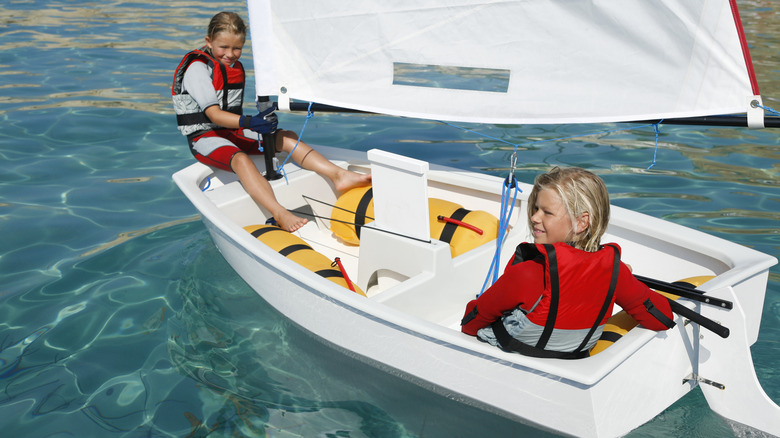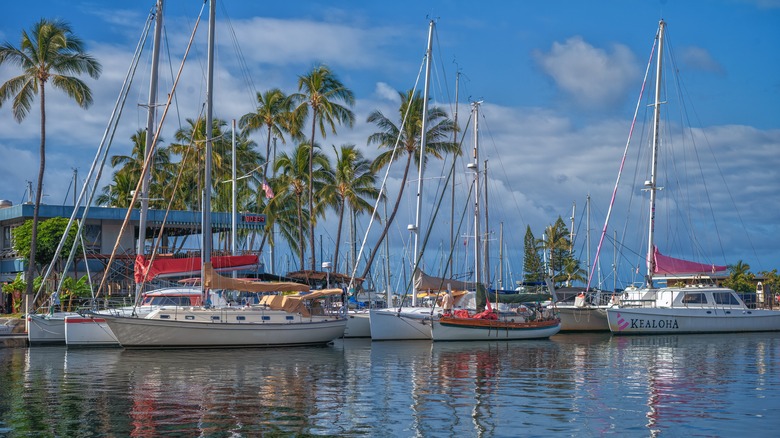5 Reasons You Should Join A Yacht Club Even If You Don't Own A Boat
When you hear "yacht club," do you picture the hoity-toity, upper-crusty Mr. and Mrs. Howell from "Gilligan's Island?" In truth, few of the world's many yacht clubs are as exclusive as the St. Francis in San Francisco, where you'll have to dress in formal attire for dinner. The membership initiation fee is rumored to be in the tens of thousands for the privilege. But just across the Golden Gate Bridge from its tony docks packed with megayachts, you can join the Air Force-affiliated Presidio Yacht Club for just $280, and wear your board shorts and flip flops onto the dance floor. And guess what? The view from the clubhouse is even better than the view from the St. Francis.
Most yacht clubs aren't snooty at all, but folksy and friendly like the Presido, and host events that are open to the public to entice new members. The Bayview Yacht Club in Detroit, Michigan, hosts Hitchhiker Thursdays when non members are welcome to come hop on board a member's sailboat for a free ride, no experience required. Should you fall in love with sailing, you still don't need a boat to join, and many clubs offer social membership plans for non-owners.
Also, just because you're land-locked, don't think joining a yacht club is out of the question. Many are on lakes, like Colorado's Dillon Yacht Club more than a mile above sea level. On Lake Mead, the Lake Mead Yacht Club caters to power boaters, while the Nevada Yacht Club is for sailors. If even thinking about wave action makes you seasick, then Los Angeles' Eagle Rock Yacht Club is for you, landlubber. This cheeky group only plays dodgeball, but they do it in the spirit of a yacht club, with camaraderie and a commitment to community service.
It's a social club
Even the smallest yacht clubs host frequent parties. At the tiny Sierra Point Yacht Club in Brisbane, California, you'll see grannies and grandkids cutting it up on the dance floor after a pot luck dinner. Non-sailing members from the neighborhood turn up for Mah Jongg games at the Tiburon Yacht Club, while in Portland, Oregon, the Rose City Yacht Club's Knauti Knitters meet up to get crafty and the Portland Yacht Clubbers golf and play bridge together. The Lake Mead Yacht Club near Las Vegas hosts poker tournaments, while the Olympic Yacht Club likes bowling.
Another thing you can do at a yacht club without owning a boat? Learn to sail. Sailboat owners who participate in casual weekly races always need sailors of all ability levels to fill their crew rosters. Some smaller boats can race with just 3-4 on board, but a 35-foot boat might require 8-12 sailors to handle sail changes, trim the jib, and fly the Spinnaker — the big, colorful nylon sail boats fly while running downwind. Getting that many people to reliably show up, week after week, is hard, so being a punctual and reliable warm body is a more important qualification than being skilled. The rest can be learned.
Positions on board range from highly technical to entry level. The easiest beginner job is a position colloquially called "rail meat." If you're "rail meat," your function is to sit on the high side of the boat with your legs dangling over the high side of the boat (pictured), using your weight to help cantilever the boat. You can learn a lot sitting there, and move up to a responsibility like trimming the jib in no time.
It's a bar where everybody knows your name
Nearly all yacht club members fondly refer to their organization as a "a drinking club with a boating problem." The heart of every yacht club is the bar, where boaters gather after a day on the water to bend an elbow. Some yacht club bars are professionally staffed, but at many, if not most, it's the members who take turns behind the bar. If you join you should volunteer, because it's a great way to meet other members. Prices are usually kept at cost, making for an affordable evening of imbibing. At the Presidio Yacht Club, you can get a beer for $3.50.
Some clubs are open every day, while others only turn on the lights for a few hours, right after the weekly "beer can races," casual sailing events where friendly competition rules, where the trophy for winning is usually a cup you can immediately fill with beer. If you're a member of a smaller club you might even be given a key to the clubhouse, so you can come and go as you please.
Just as at other types of private, members-only outfits like golf and country clubs, the laws governing the sale of alcohol are the reason you can't just walk into a yacht club without a membership and order a Dark & Stormy (that's a sailor's favorite of spiced rum and ginger ale). In most states, inspectors do turn up from time to time to make sure everyone is either a member or the registered guest of a member. In many states, like Texas, the member is the only one who can pay for a guest's drinks. Some clubs accept cash and credit cards, at others, members sign for food and beverages and receive a monthly bill.
It's a family-friendly destination
The most decorated Olympic sailor of all time, Sir Ben Ainslie, learned to sail at the age of eight in the youth program at the family-oriented Restronguet Sailing Club in Falmouth, England, where his family were members. Ainslie medaled in five consecutive Olympic games, and helped Team Oracle USA win the America's Cup.
Youth programs are a staple of summertime yacht club schedules. Many clubs maintain a fleet of small sailboats called prams (pictured) that can be sailed by children as young as five. Often these classes are open to both members and the public. U.S. Sailing, an organization that also certifies the basic keelboat sailing classes adults must pass in order to charter boats around the world (in case you'd like to visit the Greek Islands by water) has designed curricula for clubs to use sailing to foster interest in STEM subjects (science, technology, engineering and math). Many clubs have outreach programs to offer sailing to the community at large. The Portland Yacht Club in Portland, Oregon has a non-profit arm, the PYC Youth Scholarship Program, that is open to all applicants regardless of membership status. In the East Coast sailing mecca of Annapolis, the Annapolis Yacht Club's non-profit AYC Foundation operates a sailing school in nearby urban Baltimore to introduce city youth — and adults — to the magic of sailing.
It's less expensive than you think
Yacht clubs can certainly be expensive to join, but in almost every major boating community, there are options for just about every budget and lifestyle preference. Take the Seattle area, for example, where Puget Sound is one of the world's most prolific boating playgrounds. The region's oldest, the tony Seattle Yacht Club, was founded by a group of gentlemen in 1892. It doesn't publish its initiation fees, but if you have to ask, you can't afford it. (Hint: initiation at the top tier is about the price of a good used car.) However, that's just the tip of a very large iceberg. The second-oldest club in Puget Sound, the Anacortes Yacht Club, has a stunning waterfront clubhouse overlooking the San Juan Islands where Orcas play, and has an initiation fee in the hundreds, not thousands, and a social membership that's a raging bargain at just $100 if you don't own a boat.
For even less, you can join a club with no clubhouse, one that merely organizes regular events and gatherings for members. The Seattle Singles Yacht Club is just $175 per year, with the only qualification for membership being that you're unmarried, and 75% of the club's members don't own a boat. The predominantly African-American Emerald Rose Yacht club is $150 per year. The LGBTQ+ Olympic Yacht Club, founded in 1979, charges $75 per year, with an initiation fee of $25. The Cascadia Sailing Association, a Pacific Northwest yacht club that began as a lively chat group on sailnet.com, is utterly free to join and entirely virtual. They do host social events, but don't have a clubhouse location.
It's part of a worldwide network
Yacht clubs belong to umbrella organizations that recognize each other with "reciprocal privileges." If you join a club that belongs to the organization Yacht Clubs of America, you can use your card to enter any of the other 950 member clubs in the U.S. You can be a member of Tiburon Yacht Club in California, and walk into the Hawaii Yacht Club (pictured) the next time you're vacationing in Waikiki and be greeted warmly. If you want to rub elbows with Team Oracle at the St. Francis Yacht Club, you'll need to up your game by joining one of the 42 select clubs belonging to the International Council of Yacht Clubs.
Once you're in, being a member of a yacht club is like having access to a family-friendly staycation destination every weekend. It also gives you access to a worldwide network of clubs that will welcome you everywhere you go. Some clubs even have RV parking for your land yacht. Travelers also benefit from the fellowship aspect of this network. Need a recommendation for a good auto mechanic on your road trip? Chances are there's a yacht club member who can help you out. Some clubs have guest rooms that members can rent when visitors come to town. The Corinthian Yacht Club in Marblehead, Massachusetts has lovely rooms for rent, with continental breakfast and use of the pool and spa, that your in laws will absolutely love when they come for Thanksgiving. Now that's worth the price of membership right there, isn't it?





